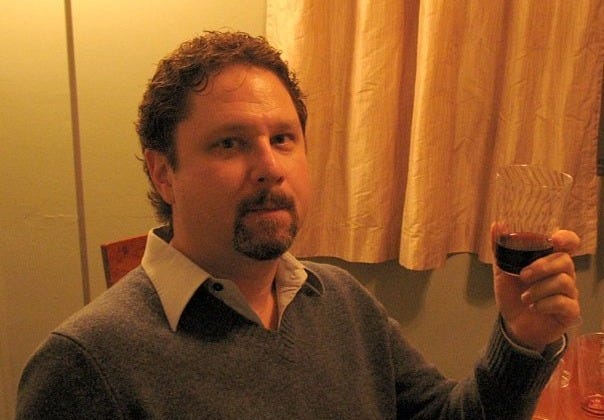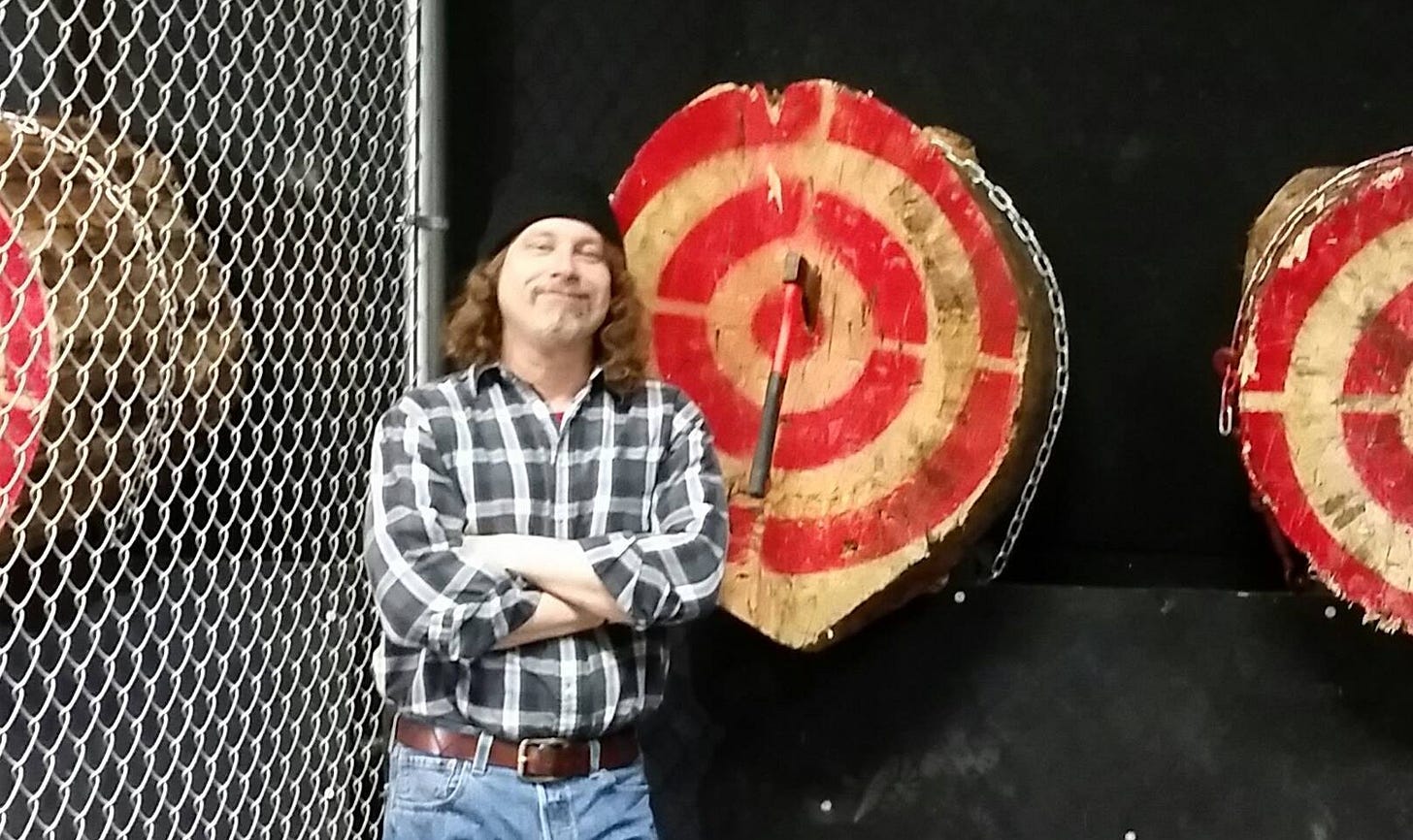Matt Kelemen deserved better
Check in on your friends. Especially the ones who might be living precariously close to the edge.
On May 7, I received a text message from Matt Kelemen, unknowingly the last I’d ever get:
It’s all good. I wasn’t sure if you worked office hours or not. I’m good but I need an objective opinion of someone who knows me. No emergency
This was in response to a text I’d sent to him apologizing for missing his recent calls. I had meant to call him back, but in the hustle of daily life—and with the object impermanence my therapist said I often experience toward people not right in front of me–I kept forgetting to do so.
And now I’ll never be able to return that call.
Last week, Matt’s lifeless body was found stuffed inside of a container inside a downtown Las Vegas business, days after he was killed by his housemate, who himself ended up dead after a high-speed chase evading Utah Highway Patrol led to his car flipping.
At least Matt got some sort of swift justice. It might be more than he ever got out of life.
I first met Matt Kelemen at one of the informal monthly gatherings of Las Vegas journalists dubbed The Hacks Society. He was, at the time, the relatively newly minted managing editor of the Las Vegas edition of glossy lifestyle publication 944 Magazine, after stints as a writer and editor for several alternative weeklies, including the Las Vegas CityLife (where I first cut my teeth as a freelancer years earlier).
Although I had just turned 30, it was still early in my professional career. I was a nontraditional student at UNLV, finishing my bachelor’s degree while working full time as a content editor for Vegas.com and freelancing for various local and national pubs. One day in the fall of 2006, I received an unexpected call from Matt to tell me about a new opportunity: The local publisher of 944 was launching a new monthly magazine, an edgy pub called Racket, something like a mix between Maxim and Juxtapoz, and he thought I would be perfect to be its managing editor.
I don't know what made Matt think of me. We had only met a few times. He was familiar with my work and knew I could edit but that's about it. He set up a meeting for me with the publisher. Despite feeling like my then-straightedge lifestyle didn’t exactly fit with either the magazine’s “no one is safe” ethos or the hard-partying atmosphere fostered at the publisher’s offices at the time, I took the Racket gig, and quickly excelled at it. (Unfortunately, within six months, I had also excelled at the partying lifestyle, too—something Matt had predicted.)
From the beginning, I sensed Matt’s discomfort with his role (early on, we shared an office, so we spent a lot of time together). Office life, managerial politics and constant social obligations—especially the heavy drinking—wore on him in ways I wouldn’t fully understand until years later.
Matt left his job at 944 midway through my time with Racket. I moved into my own office, at least for about six months, until shortly after Racket went on permanent hiatus and I moved on, career-wise.

We remained both good friends and collaborators over the next few years. He was always part of holiday celebrations. Christmas. Thanksgiving. Special occasions. Our wedding. Matt hired me to do freelance work for the next publications he edited (including Diamond Cake and Six Degrees). We occasionally jammed musically and even performed live together one evening at the Arts Factory.
But sometime around 2013 or 2014, Matt’s personal and social lives started crumbling. He was behaving erratically, likely worsened by the distorted funhouse mirror view of people social media was starting to create. He got embroiled in some ugly stuff via Facebook. He lashed out at people. He got paranoid. He started unfriending people on that platform just to see if anyone was paying attention. He sent me a scathing email that accused me of only having time for people who could benefit my “social climbing/positioning.” Like many others, I was ready to write him off.
I didn’t, though. Matt sent me a long apology email a few months later. He explained that he was having terrible migraines. That he knew he was unfairly attacking people. That he let his stresses over his diminishing financial situation and living situation (and probably smoking too much pot) get to him. There was also some resentment there, too, that he felt those of us who were reaping the benefits of the then-fresh downtown Las Vegas renaissance were doing so at the expense of folks like him who lived there when it wasn’t the cool thing to do.
I recognized Matt needed support. He said he was making a point of “fading into the background.” He was clearly suffering from some mental health issues, and didn’t have access to resources to help. I attempted to do what I could. When his editorial gigs dried up, I tried to throw as much freelance work in his direction as I could by way of referrals, and I hired him as a contractor at the design and print studio I ran when I needed extra hands.

Even after my wife and I relocated to Southern California in 2017, we still stayed in touch, talking on the phone about twice a year in between sporadic text messages. By this point, Matt had been diagnosed with various conditions that partially explained both his physical and mental/emotional difficulties that evidenced years earlier but were progressing (particularly physically—he was using a cane in the last few years). An auto-immune disease. Autism spectrum disorder. PTSD. Other issues I lost track of that he would share with me during long calls where I served as much therapist as friend.
As the media landscape collapsed alongside his health, he could never seem to get ahead financially. Those of us who transitioned into communications and marketing or entirely into new careers fared mostly OK (having partners or strong support systems also helped). Matt never regained stable career success, at least not by financial measurement. He was getting by on consistent freelance work (mostly for Las Vegas Magazine), which at least for a while afforded rent for the small downtown house he and his faithful dog, Jack, called home, where Matt could record his music and do his writing—including a screenplay he told me he was working on. But that wouldn’t last.
Jack had to be put down early in 2024, and of course, it broke Matt further. As he told me a few weeks later, “[Jack] was a special needs dog traumatized in a way I could only guess about”—clearly they were a pair made for each other.
A year later, Matt lost the lease on his rental home. With limited financial resources, he was forced to move in with a housemate. I didn’t get a chance to talk with Matt about it, but by all accounts, it was not a good situation. A mutual friend told me that last time he talked to Matt (likely the same time I was last texting with him) that they “were arguing over rent money. The roommate said Matt owed back rent. They were going to court to settle it.”
Matt never made it to court. And we’ll never really know what happened that led to his ugly, senseless death. Was it a dispute over rent money? Was it premeditated or the result of a confrontation? In the end, does it even matter? Matt’s gone, and that’s not going to change.
It’s easy to fall into the traps of “what ifs”—maybe if he hadn’t burned so many bridges (or if more people gave him another chance), there would have been someone around to realize he was in a dangerous situation and help him get out. Maybe if we had better public mental (and physical) health resources, or if Matt was diagnosed sooner, he would have gotten the support needed to keep those relationships from fraying in the first place. Maybe if I would have returned his calls instead of just texting him. So many “maybes.” None of them matter.
Despite his flaws or misunderstood intentions, Matt was a special person. At his core, he was a gentle artist who loved expressing himself through words and songs. He could be just as goofy and silly as he could be serious and creative. He was a cinephile who would have loved to make a movie. He had an eye for talent and supported his friends’ endeavors (although I probably would have done fine in my career, it's safe to say I wouldn't have had the remarkable journalistic opportunity I had if not for Matt—a sentiment I’ve seen shared by others online in recent days). He felt things deeply and his need for connection on a more meaningful level that I think made keeping casual, surface-level relationships all the more difficult for him.
I’ve lost many friends over the years, but almost all due to natural causes or random accidents. Losing Matt this way just felt wrong. Like a final, fatal kick to someone who was already trying to survive through a multitude of beatings.
I will miss my friend Matt, not just for the person he was, but for the potential of a life he never got a chance to realize.



I’m so sorry for your loss, PJ. Matt sounds like he was one of the good ones. Hope you’re doing well, all things considered. Peace.
I’m so sorry, Pj. What a tragic loss.